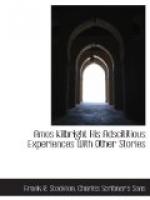“So he put him in a gully-field, whar dar was nuffin but bar’ groun’ an’ hog weed. Now, dar was nuffin in dis worl’ dat triflin’ mule hated so much as hog weed, an’ he says to hese’f: ‘I’s boun’ ter do somefin’ better’n dis fur a libin. I reckin I’ll go skeer dat ole Harris, an’ make him gib me a feed o’ corn.’ So he jump ober de fence, fur he was spry ‘nuf when he had a min’ ter, an’ he steals an ole bar skin dat he’d seen hangin’ up in de store po’ch, an’ he pretty nigh kivered himse’f all up wid it. Den he go down to de pos’ offis, whar de mail had jes’ come in. When dis triflin’ ole mule seed de cullud man, Harris, sittin’ on de bottom step ob de po’ch, he begin to kick up his heels an’ make all de noise he could wid he mouf. ‘Wot’s dat?’ cried de cullud man, Harris. ‘I’s a big grizzly bar,’ said de mule, ’’scaped from de ’nagerie when ‘twas fordin’ Scott’s Creek.’ ‘When did you git out?’ said de cullud man, Harris. ‘I bus’ from de cage at half pas’ free o’clock dis ebenin’.’ ‘An’ is you reely a grizzly bar?’ ‘Dat’s de truf,’ said de triflin’ mule, ‘an’ I’s pow’ful hungry, an’ if you don’ go git me a feed o’ corn I’ll swaller you down whole.’ An’ he begun to roar as like a grizzly bar as he knew how. ‘Dat all de truf, you tellin’ me?’ de cullud man, Harris, ask. ‘Dat’s all true as I’s libin’,’ says de triflin’ mule. ‘All right, den,’ says de cullud man, Harris, ’if you kin come from de ford on Scott’s Creek in a hour an’ a half, you kin carry de mail jes’ as well as any udder mule, an’ I’s gwine ter buy a big cart whip, an’ make you do it. So take off dat bar skin, an’ come ‘long wid me.’ So you see Brudder Gran’son,” continued ’Bijah, “dar’s dif’rent kinds ob truf, an’ you’s got ter be mighty ’ticklar wot kind you sticks ter.”
“Git up,” said Grandison to his drowsy horse, as he started him on another furrow.
PLAIN FISHING.
“Well, sir,” said old Peter, as he came out on the porch with his pipe, “so you came here to go fishin’?”
Peter Gruse was the owner of the farm-house where I had arrived that day, just before supper-time. He was a short, strong-built old man, with a pair of pretty daughters, and little gold rings in his ears. Two things distinguished him from the farmers in the country round about: one was the rings in his ears, and the other was the large and comfortable house in which he kept his pretty daughters. The other farmers in that region had fine large barns for their cattle and horses, but very poor houses for their daughters. Old Peter’s ear-rings were indirectly connected with his house. He had not always lived among those mountains. He had been on the sea, where his ears were decorated, and he had travelled a good deal on land, where he had ornamented his mind with many ideas which were not in general use in the part of his State in which he was born. His house stood a little back from the high road, and if a traveller wished to be entertained, Peter was generally willing to take him in, provided he had left his wife and family at home. The old man himself had no objection to wives and children, but his two pretty daughters had.




